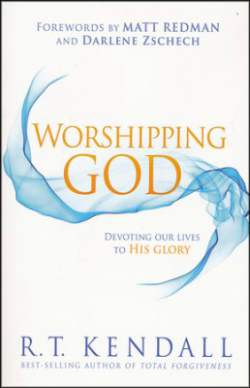Entering Into Worship That Breaks the Bonds of Egypt
Did you know there is a much deeper level of worship than what we can do? Admittedly, in response to the Holy Spirit our actions of praying, praising, listening, loving and obeying are part of worship. And there is nothing wrong with that. But there is a much deeper level of worship, one in which we are unable to express ourselves verbally or non-verbally—where we are utterly passive. The highest and most intensive worship takes place when we can do nothing but be amazed, when we are rendered helpless and speechless with wonder and gratitude, when we just sit back and watch God work. This is what Isaiah is talking about when he says, “For thus says the Lord God, the Holy One of Israel: “In returning and rest you shall be saved; in quietness and in confidence shall be your strength” (Is. 30:15).
In worship at this depth, we are kept from even saying “thank You.” For, at the risk of being misunderstood, I am prepared to say that our gratitude sometimes gets in the way of praise. Gratitude can be an attempt to get the balance even again. Probably you have experienced on a human level something of what I am getting at. Someone does something for you, and you know very well that he or she wants you to be thankful, and you are, so you express your gratitude. You try to be extremely thankful so that this person will see how you really feel. Or you try to return the favor in some way. This gives you a feeling of satisfaction.
Have you ever been placed in a situation where there was nothing you could say or do? Someone did something immensely wonderful, and you weren’t able to do anything except feel grateful? Or perhaps the person went away, and you wish you could find him or her to say how much you appreciated what was done. And maybe you felt frustrated, and some of your joy was taken away because it was not possible to express your gratitude. On the natural level, we always feel we must do something.
But Isaiah says that our salvation lies in the fact that we do nothing: “In returning and rest, you shall be saved.” I did not say that we feel nothing, but that we do nothing. This, says Isaiah, is the best way to live—the way God wants us to live. It constitutes the greatest joy there is. And even though we are rendered helpless—as though we are just standing there with our mouth wide open—God sees how we feel and knows we are grateful.
Yet, though this is what God wanted, the people Isaiah was speaking to did not do this. It reads “… in quietness and in confidence shall be your strength. Yet you were not willing” (Isa. 30:15, emphasis added). The people wanted “to do” instead. They said, “for we will flee on horses … We will ride on swift horses” (v. 16). And that’s the way so many of us are. We can’t imagine getting satisfaction from anything but “doing.” We must be always working, always on the go. We feel guilty if we are not on the move.
Isaiah 30:15 is set in the context of a solemn rebuke. The people of Israel thought they had better ideas than God on how to fight their battles—and they had actually turned to Egypt for help.
And it is at this point that Isaiah had the boldness to tell the people what God envisioned for them: “For thus says the Lord God, the Holy One of Israel: In returning and rest you shall be saved” (v. 15a). Not in going to Egypt, but in just looking to God and relying on him. “In quietness and confidence shall be your strength” (v. 15b). All God asked for was the complete trust of the people. He wanted them to get their joy from seeing Him accomplish His Word. But they wouldn’t have it.
Two Christian doctrines emerge here, the first of which is justification—being made righteous in God’s sight—by faith alone. Romans 4:2 says “If Abraham was justified by works, he has something to boast about, but not before God.” And verse 5 says, “But to him who does not work, but believes in Him who justifies the ungodly, his faith is credited as righteousness.” So if any of us think we will go to heaven when we die because we’ve tried to live a good life and haven’t done much wrong and haven’t hurt anybody, then we must see that we are wrong and are at this moment on our way to hell. God does not justify us because of our actions or our words. Justification comes simply by trusting in what Jesus did on the cross.
The second doctrine concerns the living of the Christian life. Our Christian life must be lived without confidence in works. I don’t mean it’s to be lived without works, but it’s to be lived without relying on what we do to get God’s approval. We must not feel conscious of any good we are doing but must consider that what we are doing is nothing. As long as we are conscious of our works or derive our assurance from them—as long as we are so impertinent as to conclude that we are saved because we do good things—then we grieve the Spirit and cut ourselves off from the joy that can be ours just by trusting in His Word alone.
Isaiah very much wanted the people to enjoy hearing the voice of God. The way to do this is through rest! “In returning and rest you shall be saved.” Hebrews 4:10 says, “For whoever enters His rest will also cease from his own works, as God did from His.” And the key phrase here is, “from his own works.” We need to stop feeling the need to be always on the go. We must stop getting our joy from “being involved.” If we are frustrated and burnt out, then there is no trust. But when we cease from our own work and just do nothing—then we see that God likes us just the way we are—and that is when we worship!
Real worship is directed towards One who doesn’t want anything from us for what He has done for us. There are no strings attached. God only wants us to trust Him. He wants us to experience the joy of doing nothing, nothing but resting on the fact that He loves us. God wants us just to look to Him and say, “Lord, I don’t know how much I love You. But I know how much You love me.” Rest on that and let God love you. Then you will stand in awe.
That’s the way we are saved. That’s the way we are to love. And that’s what will bring true worship by the Holy Spirit.
 Adapted from Worshipping God by R. T. Kendall, copyright 2017, published by Charisma House, Charisma Media/Charisma House Book Group. In this book Dr. Kendall explains why true worship is fuller and deeper than what most of us believe, and gives us understanding on what God really expects from us through worship. To order your copy, click on this link.
Adapted from Worshipping God by R. T. Kendall, copyright 2017, published by Charisma House, Charisma Media/Charisma House Book Group. In this book Dr. Kendall explains why true worship is fuller and deeper than what most of us believe, and gives us understanding on what God really expects from us through worship. To order your copy, click on this link.
Prayer Power for the Week of July 23, 2017
This week, meditate on the truth of God’s Word regarding salvation and what it means to your life here and now. Engage in all facets of praise and worship as you incorporate them into your prayer life. Continue to pray for worldwide revival, and ask the Lord to give you divine connections with those of like mind so you can join with them in praying for our nation, its allies, our servicemen and women, our government and spiritual leaders. Remember Israel and the persecuted church. Read Isaiah 30:15, Hebrews 4:10, Matt. 6:3, Galatians 2:20.














































